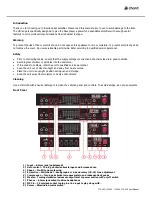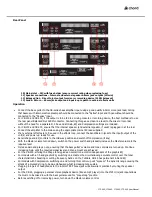
173.442, 173.443, 173.444, 173.445 User Manual
Rear Panel
Operation
Connect the bass guitar to the CB-series bass amplifier input using a good quality 6.3mm mono jack lead, noting
that basses with internal active preamps should be connected to the “Active” input and those without should be
connected to the “Passive” input
For CB-100 and CB-200, if the output is to be fed to a mixing console or recording device, the best method is to use
the rear panel Balanced Out XLRM connector. Connecting this gives a clean line level to the mixer or recorder
without the need for a separate D.I. box and all Gain, EQ and Compression settings are included.
For CB-100 and CB-200, ensure that the internal speaker (and external speaker, if used) is plugged in at the rear
Connect the amplifier to the mains using the appropriate mains IEC lead supplied
If any external effects are to be used in the effects loop, connect the Send/Return jacks to the input/output of the
unit(s) and power up ready for use
Set all shape and EQ controls to the mid-way position and switch off compression (if any)
With the Master volume turned down, switch on the power switch and gradually increase the Master volume to the
required level
Increase Gain and play a note, ensuring that the bass guitar’s volume and tone controls are turned up. Continue
increasing Gain until the required signal level and drive amount are achieved
For the CB-200, altering the Shape rotary gives an overall tone control independent of the graphic EQ
For models with a 7-band graphic EQ, switching on activates the circuit allowing accurate control over the tonal
characteristics by boosting or cutting frequency bands on the 7 sliders. CB-25 has permanent 4-band EQ
For models with Compression, switching on and turning this control up will “squeeze” the dynamic range causing the
attack of a plucked string to be de-emphasised whilst increasing note sustain
Plugging in a pair of headphones to the 6.3mm TRS Phones jack will allow silent practice by muting the speaker
output.
For the CB-25, plugging a personal stereo playback device (like an mp3 player) into the MP3 mini-jack input allows
the music to be mixed in with the bass guitar sound for “play-along” practice.
Before switching off or removing power, turn down the Master volume control.
10)
Mains inlet – IEC with fuse holder (ensure correct rating when replacing fuse)
11)
Speaker connections – Internal and external speaker 6.6mm jack outputs (4Ω min)
12)
Balanced Out – Direct Inject output for mixer or recording device (XLRM balanced)
13)
Send & Return – 6.3mm jack output and input loop to patch in external effects units






















